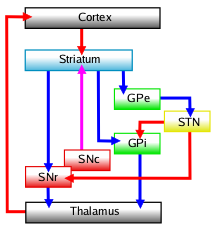Basal ganglia disease
Editor-In-Chief: Prab R Tumpati, MD
Obesity, Sleep & Internal medicine
Founder, WikiMD Wellnesspedia &
W8MD medical weight loss NYC and sleep center NYC
| Basal ganglia disease | |
|---|---|

| |
| Synonyms | N/A |
| Pronounce | N/A |
| Specialty | N/A |
| Symptoms | Movement disorders, cognitive dysfunction, psychiatric symptoms |
| Complications | Parkinson's disease, Huntington's disease, dystonia, tremor |
| Onset | Varies depending on specific condition |
| Duration | Chronic |
| Types | N/A |
| Causes | Genetic disorders, infections, stroke, trauma |
| Risks | Family history, age, environmental factors |
| Diagnosis | Clinical examination, neuroimaging |
| Differential diagnosis | Parkinsonism, essential tremor, cerebellar ataxia |
| Prevention | N/A |
| Treatment | Medication, surgery, physical therapy |
| Medication | N/A |
| Prognosis | Varies depending on specific condition |
| Frequency | Common in elderly |
| Deaths | N/A |
The basal ganglia are a group of nuclei in the brain interconnected with the cerebral cortex, thalamus, and brainstem, associated with a variety of functions: motor control, emotions, cognition, and learning. Diseases affecting the basal ganglia can lead to a range of neurological deficits, known collectively as basal ganglia diseases. These conditions can significantly impact an individual's quality of life, necessitating a comprehensive understanding for effective management.
Etiology[edit | edit source]
Basal ganglia diseases can arise from a variety of causes, including genetic mutations, environmental factors, and complications from other diseases. Common conditions affecting the basal ganglia include Parkinson's disease, Huntington's disease, and Wilson's disease, each with distinct etiologies. For instance, Parkinson's disease is primarily caused by the loss of dopamine-producing neurons in the substantia nigra, a component of the basal ganglia.
Symptoms[edit | edit source]
Symptoms of basal ganglia diseases vary depending on the specific condition but generally include:
- Motor symptoms: tremors, bradykinesia (slowness of movement), rigidity, and dystonia.
- Cognitive symptoms: executive function deficits, memory problems, and in some cases, dementia.
- Emotional symptoms: depression, anxiety, and mood swings.
Diagnosis[edit | edit source]
Diagnosis of basal ganglia diseases involves a combination of clinical evaluation, imaging studies such as MRI and CT scan, and sometimes genetic testing. Neurological examination focuses on identifying characteristic motor and cognitive abnormalities.
Treatment[edit | edit source]
Treatment for basal ganglia diseases is primarily symptomatic and may include medications, physical therapy, and in some cases, surgical interventions like deep brain stimulation (DBS). For example, Parkinson's disease treatment often involves dopamine replacement therapy, while Huntington's disease management is more focused on controlling symptoms.
Prognosis[edit | edit source]
The prognosis of basal ganglia diseases varies widely among different conditions. While some, like Parkinson's disease, have a progressive course but can be managed for years with treatment, others, such as certain forms of genetic dystonia, may have a more stable course.
Prevention[edit | edit source]
Prevention of basal ganglia diseases focuses on controlling risk factors where possible, such as avoiding environmental toxins and managing underlying conditions that could contribute to basal ganglia damage.
Research Directions[edit | edit source]
Current research on basal ganglia diseases is exploring novel therapeutic approaches, including gene therapy, neuroprotective agents, and advancements in surgical techniques. Understanding the molecular and cellular mechanisms underlying these conditions is crucial for developing targeted treatments.
This article is a neuroscience stub. You can help WikiMD by expanding it!
Transform your life with W8MD's budget GLP1 injections from $125
W8MD offers a medical weight loss program NYC and a clinic to lose weight in Philadelphia. Our W8MD's physician supervised medical weight loss centers in NYC provides expert medical guidance, and offers telemedicine options for convenience.
Why choose W8MD?
- Comprehensive care with FDA-approved weight loss medications including:
- loss injections in NYC both generic and brand names:
- weight loss medications including Phentermine, Qsymia, Diethylpropion etc.
- Accept most insurances for visits or discounted self pay cost.
- Generic weight loss injections starting from just $125.00 for the starting dose
- In person weight loss NYC and telemedicine medical weight loss options in New York city available
- Budget GLP1 weight loss injections in NYC starting from $125.00 biweekly with insurance!
Book Your Appointment
Start your NYC weight loss journey today at our NYC medical weight loss, and Philadelphia medical weight loss Call (718)946-5500 for NY and 215 676 2334 for PA
Search WikiMD
Ad.Tired of being Overweight? Try W8MD's NYC physician weight loss.
Semaglutide (Ozempic / Wegovy and Tirzepatide (Mounjaro / Zepbound) available. Call 718 946 5500.
Advertise on WikiMD
|
WikiMD's Wellness Encyclopedia |
| Let Food Be Thy Medicine Medicine Thy Food - Hippocrates |
Translate this page: - East Asian
中文,
日本,
한국어,
South Asian
हिन्दी,
தமிழ்,
తెలుగు,
Urdu,
ಕನ್ನಡ,
Southeast Asian
Indonesian,
Vietnamese,
Thai,
မြန်မာဘာသာ,
বাংলা
European
español,
Deutsch,
français,
Greek,
português do Brasil,
polski,
română,
русский,
Nederlands,
norsk,
svenska,
suomi,
Italian
Middle Eastern & African
عربى,
Turkish,
Persian,
Hebrew,
Afrikaans,
isiZulu,
Kiswahili,
Other
Bulgarian,
Hungarian,
Czech,
Swedish,
മലയാളം,
मराठी,
ਪੰਜਾਬੀ,
ગુજરાતી,
Portuguese,
Ukrainian
Medical Disclaimer: WikiMD is not a substitute for professional medical advice. The information on WikiMD is provided as an information resource only, may be incorrect, outdated or misleading, and is not to be used or relied on for any diagnostic or treatment purposes. Please consult your health care provider before making any healthcare decisions or for guidance about a specific medical condition. WikiMD expressly disclaims responsibility, and shall have no liability, for any damages, loss, injury, or liability whatsoever suffered as a result of your reliance on the information contained in this site. By visiting this site you agree to the foregoing terms and conditions, which may from time to time be changed or supplemented by WikiMD. If you do not agree to the foregoing terms and conditions, you should not enter or use this site. See full disclaimer.
Credits:Most images are courtesy of Wikimedia commons, and templates, categories Wikipedia, licensed under CC BY SA or similar.
Contributors: Prab R. Tumpati, MD





